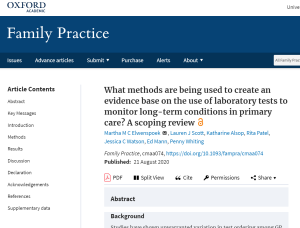Review reveals lack of evidence on frequency and necessity of testing for chronic conditions in primary care
24 August 2020
A review of 94 studies on optimal testing for chronic conditions in primary care has found that no studies address the questions of how often tests should be carried out and whether the tests benefit the patient.
The researchers, from NIHR ARC West and the University of Bristol, found that studies focused on which test to use but not how often the test should be repeated. Many studies investigated the accuracy of the test or compared one test to another without answering the more fundamental questions of whether doing the test is necessary or beneficial.
Around half of laboratory tests ordered by GPs are tests to monitor long-term conditions. Guidelines that recommend which tests should be used, and when to use them, are largely based on expert opinion because strong evidence is missing. Doing too many or too few tests can cause harm to patients and increase healthcare costs.
The aim of this review was to give an overview of the studies investigating optimal testing and to examine how they went about it. The team looked at what methods the researchers used to answer the questions ‘which test should GPs use and how often’ for patients with long-term conditions.
The research team have been investigating how to optimise testing in primary care, and their work has revealed many gaps in the evidence. To improve testing guidelines, researchers need to establish how to generate the missing evidence.
Martha Elwenspoek, Research Associate at NIHR ARC West and lead author on the paper, said:
“Studies in the future need to address the gaps our work has identified. These studies need to use high quality, robust study designs such as randomised controlled trials. This will help uncover the benefits to patients of one testing strategy compared to another.”
Paper
What methods are being used to create an evidence base on the use of lab tests to monitor long-term conditions in primary care? A scoping review
Martha Elwenspoek, Lauren Scott, Katharine Alsop, Rita Patel, Jessica Watson, Ed Mann, Penny Whiting
Published in Family Practice
Paper
